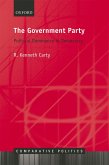Party System Closure maps trends in interparty relations in Europe from 1848 until 2019. It investigates how the length of democratic experience, the institutionalization of individual parties, the fragmentation of parliaments, and the support for anti-establishment parties, shape the degree of institutionalization of party systems. The analyses presented answer the questions of whether predictability in partisan interactions is necessary for the survival of democratic regimes and whether it improves or undermines the quality of democracy. The developments of party politics at the elite level are contrasted with the dynamics of voting behaviour. The comparisons of distinct historical periods and of macro-regions provide a comprehensive picture of the European history of party competition and cooperation. The empirical overview presented in the book is based on a novel conceptual framework and features party composition data of more than a thousand European governments. Party systems are analysed in terms of poles and blocs, and the degree of closure and of polarization is related to a new party system typology. The book demonstrates that information collected from partisan interactions at the time of government formation can reveal changes that characterise the party system as a whole. The empirical results confirm that the Cold War period (1945-1989) was exceptionally stable, while the post-Berlin-Wall era shows signs of disintegration, although more at the level of voters than at the level of elites. After three decades of democratic politics in Europe (1990-2019), the West and the South are looking increasingly like the East, especially in terms of the level of party de-institutionalization. The West and the South are becoming more polarised than the East, but in terms of parliamentary fragmentation, the party systems of the South and the East are converging, while the West is diverging from the rest with its increasingly high number of parties. As far as our central concept, party system closure, is concerned, thanks to the gradual process of stabilization in the East, and the recent de-institutionalization in the West and South, the regional differences are declining. Comparative Politics is a series for researchers, teachers, and students of political science that deals with contemporary government and politics. Global in scope, books in the series are characterised by a stress on comparative analysis and strong methodological rigour. The series is published in association with the European Consortium for Political Research. For more information visit: www.ecprnet.eu. The series is edited by Susan Scarrow, Chair of the Department of Political Science, University of Houston, and Jonathan Slapin, Professor of Political Institutions and European Politics, Department of Political Science, University of Zurich.
Dieser Download kann aus rechtlichen Gründen nur mit Rechnungsadresse in A, B, BG, CY, CZ, D, DK, EW, E, FIN, F, GR, HR, H, IRL, I, LT, L, LR, M, NL, PL, P, R, S, SLO, SK ausgeliefert werden.









